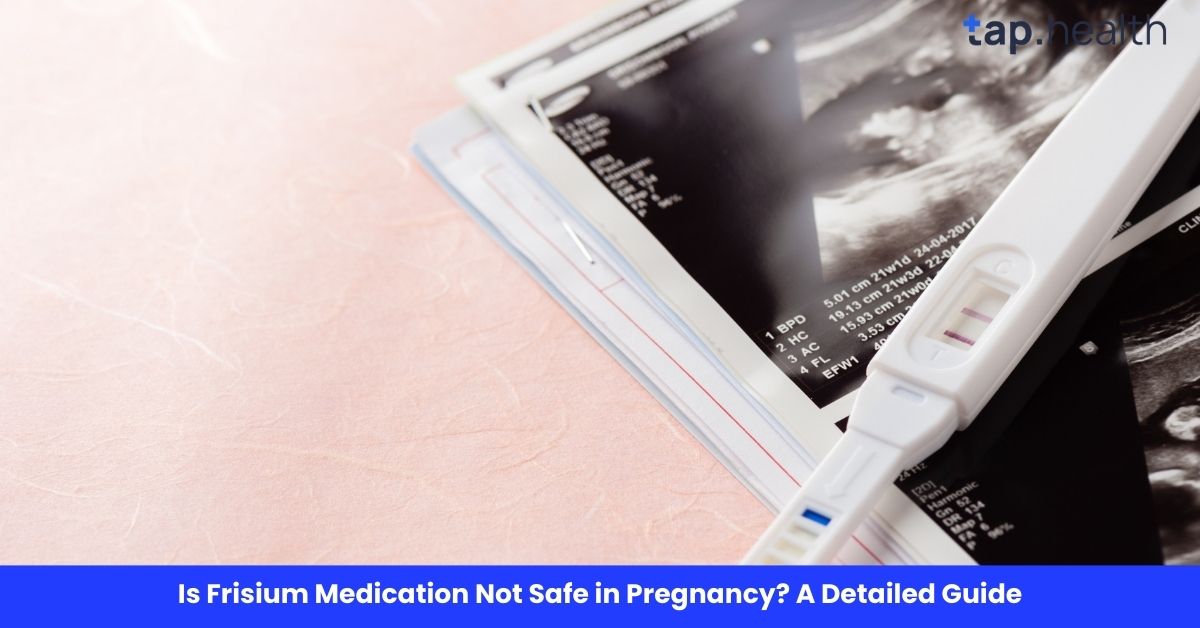When you’re pregnant, everything you consume — from food to medication — can directly affect your health and the well-being of your baby. One common concern among pregnant women is whether certain medications are safe to take. Frisium, known by its generic name Clobazam, is one such medication that might raise questions for expectant mothers.
In this blog, we will dive deep into whether Frisium (Clobazam) is safe during pregnancy, its potential risks, and what alternatives might exist for those who need similar treatment. We’ll cover everything from medical expert advice to real-world considerations, and answer all the common questions related to this topic.
What Is Frisium (Clobazam)?
Frisium is a medication primarily used to treat anxiety, seizures, and certain neurological conditions. It belongs to the benzodiazepine class of drugs, which work by calming the brain and nervous system. Doctors often prescribe it to manage conditions like epilepsy, anxiety disorders, and sometimes as a short-term treatment for panic attacks.
How Does Frisium Work?
Frisium works by enhancing the effects of a neurotransmitter called gamma-aminobutyric acid (GABA) in the brain. This results in a calming effect on the nervous system, which is why it’s effective for treating conditions like seizures and anxiety.
Common Uses of Frisium
- Epilepsy: To prevent and control seizures
- Anxiety: To reduce anxiety levels in patients with anxiety disorders
- Panic Attacks: To provide relief for those experiencing acute panic attacks
- Muscle Relaxation: In some cases, Frisium is used to treat muscle spasms
Now that we understand what Frisium is and how it works, let’s explore whether it is safe for use during pregnancy.
Is Frisium Safe to Take During Pregnancy?
The question of whether Frisium is safe during pregnancy is a complex one and often depends on a variety of factors, including the stage of pregnancy, the health of the mother, and the severity of the condition being treated.
Category C Pregnancy Drug
Frisium (Clobazam) is classified as a Category C drug by the U.S. Food and Drug Administration (FDA). This means that animal studies have shown some potential risk to the fetus, but there are no well-controlled studies in humans. The drug should only be used during pregnancy if the potential benefit justifies the potential risk to the fetus.
What does this mean for you? If you are pregnant and your doctor has prescribed Frisium, it is important to understand that while animal studies suggest risks, it doesn’t necessarily mean that it will harm a human fetus. However, due to the lack of human studies, the use of Frisium during pregnancy should be approached with caution.
First Trimester Risks
During the first trimester, the fetus is particularly vulnerable to any substances that might interfere with its development. This is the period when the major organs and systems are forming, so taking any medication, including Frisium, should be done only under the supervision of a healthcare provider. Some studies have indicated that the use of benzodiazepines, like Frisium, during the first trimester may increase the risk of certain birth defects, though the evidence is not definitive.
Third Trimester Concerns
If taken late in pregnancy, Frisium can cause withdrawal symptoms in the newborn baby after birth. This is because the drug can pass through the placenta and affect the fetus. Babies exposed to benzodiazepines like Frisium in the third trimester may experience symptoms such as lethargy, difficulty feeding, and trouble breathing after birth.
What Are the Potential Risks of Taking Frisium During Pregnancy?
While the potential risks of Frisium during pregnancy cannot be completely ruled out, several studies have explored the possible dangers associated with its use.
1. Birth Defects
As mentioned earlier, some animal studies have shown that taking Frisium during pregnancy may increase the risk of birth defects, including defects in the brain, heart, and spinal cord. However, more research is needed to determine the extent to which these risks apply to human pregnancies.
2. Withdrawal Symptoms in Newborns
One of the most concerning effects of taking Frisium later in pregnancy is the risk of withdrawal symptoms in newborns. Babies born to mothers who have taken benzodiazepines like Frisium in the third trimester may experience symptoms such as:
- Difficulty breathing
- Poor muscle tone
- Feeding problems
- Crying or irritability
- Trouble sleeping
These symptoms can be severe and require medical attention.
3. Preterm Birth and Low Birth Weight
Some studies have linked the use of benzodiazepines during pregnancy with a higher risk of preterm birth and low birth weight. These factors can contribute to various health complications for the baby, including developmental delays and difficulties in breathing or feeding after birth.
What Should You Do If You Are Pregnant and Taking Frisium?
If you are pregnant and currently taking Frisium, it’s essential to consult with your healthcare provider as soon as possible. Your doctor will evaluate the risks and benefits of continuing the medication during pregnancy and may suggest alternatives or adjustments to your treatment plan.
1. Consider Non-Pharmacological Alternatives
For some conditions like anxiety and panic attacks, non-drug therapies such as cognitive behavioral therapy (CBT) or other forms of psychotherapy can be effective alternatives. These treatments do not carry the same risks as medications like Frisium and can provide long-term relief without harming the fetus.
2. Switch to Safer Medications
In cases where medication is necessary, your doctor might recommend safer alternatives that are known to be less harmful during pregnancy. For example, some antianxiety medications or anticonvulsants may be considered safer options for pregnant women.
3. Follow Your Doctor’s Guidance
If stopping Frisium suddenly is not an option due to the severity of your condition, your doctor may adjust your dosage or switch you to a medication that is known to be safer during pregnancy. Never attempt to adjust your dosage or stop taking Frisium on your own without professional guidance.
Is Frisium Safe While Breastfeeding?
Another important consideration is whether Frisium is safe to take while breastfeeding. Since Frisium can pass into breast milk, it could potentially affect the baby. If you’re breastfeeding, it’s crucial to talk to your doctor before continuing or starting Frisium.
Risks to the Breastfed Baby
When taking Frisium while breastfeeding, the baby may experience drowsiness, lethargy, or poor feeding, similar to the withdrawal symptoms that might occur after birth. Some experts recommend avoiding Frisium while breastfeeding if possible, especially during the early months of the baby’s life.
Are There Any Alternatives to Frisium for Pregnant Women?
If you need treatment for anxiety, seizures, or other conditions during pregnancy, several alternative medications may be considered safer.
1. For Anxiety:
Non-benzodiazepine medications, such as SSRIs (Selective Serotonin Reuptake Inhibitors) or SNRIs (Serotonin-Norepinephrine Reuptake Inhibitors), are often prescribed during pregnancy and are considered safer than benzodiazepines.
2. For Seizures:
Other anticonvulsant drugs, such as Lamotrigine or Levetiracetam, may be recommended as safer alternatives to Frisium, depending on the type of seizures you experience.
3. Non-Drug Treatments:
As mentioned earlier, therapies like CBT for anxiety, physical therapy, or even relaxation techniques may be effective alternatives for managing symptoms without using medication.
Real-Life Scenario
Consider a woman with epilepsy who relies on Frisium to prevent seizures. She becomes pregnant and worries about the potential effects on her baby. Stopping the medication abruptly can trigger severe seizures, which can harm both her and the fetus. In such cases, doctors carefully weigh the benefits of continuing treatment against the potential risks to ensure both mother and child are safe.
Expert Contribution
Medical experts advise that Frisium should only be used during pregnancy if absolutely necessary. Neurologists and obstetricians often recommend the lowest effective dose and may switch to safer alternatives when possible. Continuous monitoring of both the mother and fetus is crucial throughout the pregnancy.
Recommendations Grounded in Proven Research and Facts
- Consult your doctor before taking Frisium: Never start or stop the medication on your own during pregnancy.
- Use the lowest effective dose: This reduces the potential risk to the baby while controlling symptoms.
- Consider safer alternatives: In some cases, other anti-seizure medications with better pregnancy safety profiles may be recommended.
- Regular prenatal monitoring: Ultrasounds and other tests can help track fetal development if Frisium is used.
- Do not abruptly discontinue: Stopping suddenly can cause seizures, which are dangerous for both mother and baby.
Frequently Asked Questions (FAQ) on Is Frisium Medication Not Safe in Pregnancy? A Detailed Guide
1. Can I take Frisium in early pregnancy?
Taking Frisium during early pregnancy should be done only if absolutely necessary. The risks of birth defects or complications may be higher during the first trimester, so it’s crucial to consult with a doctor.
2. What are the signs that my baby is having withdrawal symptoms from Frisium?
Signs of withdrawal in a newborn may include difficulty breathing, poor muscle tone, excessive crying, or feeding problems. If you notice any of these symptoms, seek immediate medical attention.
3. Is it okay to stop Frisium during pregnancy?
Never stop taking Frisium suddenly without consulting your healthcare provider. Discontinuing medication abruptly can lead to withdrawal symptoms or a relapse of your condition.
4. What are safer alternatives to Frisium during pregnancy?
For anxiety, alternatives like SSRIs or psychotherapy may be recommended. For seizures, other anticonvulsants like Lamotrigine may be safer options.
5. Can I breastfeed while taking Frisium?
It is advised to avoid Frisium while breastfeeding, as it can pass into breast milk and may affect your baby’s health.
In conclusion, while Frisium is an effective medication for certain conditions, its use during pregnancy should be approached with caution. The potential risks to both the mother and the baby make it essential to seek medical advice before continuing or starting treatment with Frisium during pregnancy. Always prioritize your health and the health of your baby by working closely with your healthcare provider to find the safest treatment options.



